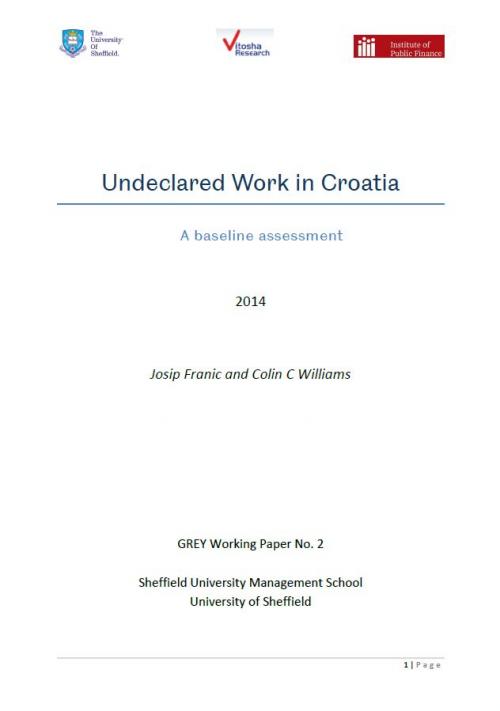GREY Working Paper No. 2: Undeclared Work in Croatia: a Baseline Assessment
GREY Working Paper No. 2: Undeclared Work in Croatia: a Baseline Assessment
Author(s): Josip Franic, Colin C. Williams
Subject(s): Politics / Political Sciences, Politics, Social Sciences, Economy, National Economy, Sociology, Economic development, Socio-Economic Research
Published by: Център за изследване на демокрацията
Summary/Abstract: This working paper is an output of the European Commission’s FP7 "Marie Curie Industry-Academia Partnerships and Pathways" (IAPP) project entitled "GREY - Out of the shadows: developing capacities and capabilities for tackling undeclared work in Bulgaria, Croatia and FYR Macedonia". Mr. Josip Franic and Pfof. Colin C. Williams, GREY-IAPP Sheffield University Management School, University of Sheffield elaborated the report in April 2014. The aim of this report is to evaluate the extent and nature of undeclared work in Croatia and the policy approaches and measures currently employed to tackle this sphere. The authors note that firms in agriculture and related industries are the most likely to recognise competition from unregistered or informal firms as a serious obstacle to their business. In addition, small and medium-sized firms are far more likely to identify the existence of the unregistered units in their sector than are large firms. Finally, domestic owned and non-exporting businesses more often witness the presence of unregistered firms and the constraints caused by them in comparison with exporters and firms in foreign ownership. A key problem is the weak coordination among ministries and various government departments when pursuing the fight against undeclared work. Each of them defines their own separate targets and this often results in an overlapping and/or awkward division of responsibilities. This raises a need for reorganisation of the existing institutional system in order to achieve better efficiency. One viable option is the establishment of a central coordination body, which would harmonise activities in this field. In that regard, one might argue whether a recent reform in the inspection system was indeed a move in a positive direction, or whether it will result in the deteriorated effectiveness of enforcement. A further problem is the weak social dialogue in Croatia in this context characterised by numerous disputes between the government and trade unions. As such, tripartite social dialogue currently has a limited role in tackling undeclared work, therefore representing a further area for the achievement of a significant improvement.
Series: CSD Economy Papers
- Page Count: 53
- Publication Year: 2014
- Language: English
- Content File-PDF
- Introduction

